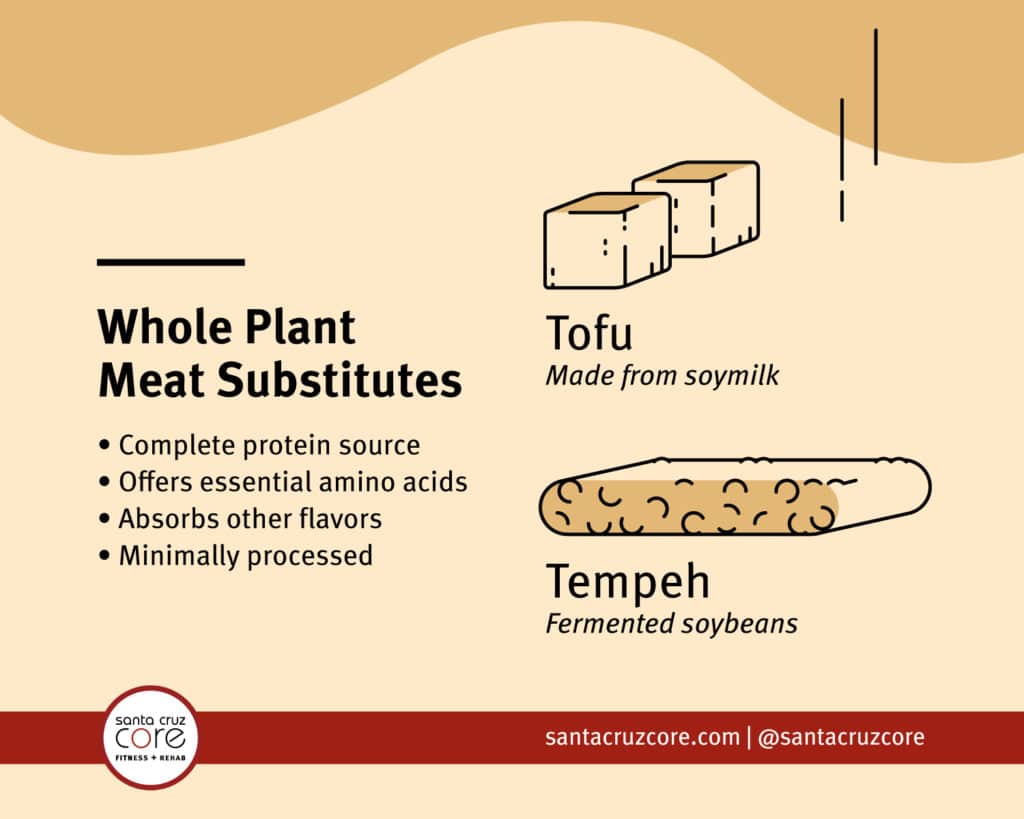Health and environmental-friendly communities in the United States are urging Americans to eat more plant-based foods.
Themes like meatless Mondays and one meatless meal per day are becoming more and more common. The goal here is to get people to eat more plants, which are associated with health benefits like lower blood pressure and reduced risk of chronic illnesses (Tello, 2018).
This leads many to consider meat substitutes to replace the traditional animal protein portion of a meal with something that is plant-based.
Meat Substitutes
When considering a meat substitute most of us focus on taste, texture, and nutritional value. How much does it feel or taste like meat? And how similar is the nutrient profile to that of meat, more importantly, is it a complete protein?
Luckily, there are a lot of plant and plant-based substitutes that meet this criteria and can offer a similar if not better nutrient profiles than that meat. Whole plant meat substitutes include products that are minimally processed and often include reshaping plant foods. Examples of this include tofu, tempeh, and bean or chickpea patties.
Other plant-based meat substitutes, like Impossible Meat or Beyond Meat products, are more heavily processed and resemble the texture and taste of meat a lot more. Deciding which to go with greatly depends on the consumer, their preferences, and health concerns.
Whole Plant Meat Substitutes
Two of the most well-known substitutes for meat include soy products like tofu (made from soymilk) and tempeh (fermented soybeans). Soy products are good meat substitutes because they are a complete protein source, they offer all essential amino acids, and because they are good at absorbing other flavors.
A good example of this is soy chorizo, which can be made by using soy beans and flavoring with spices to mimic the flavor of traditional chorizo. Tempeh has the extra benefit of being fermented which may make it easier to digest and it is rich in probiotics.
Other whole plant meat substitutes include using legumes and/or grains, and reshaping to mimic a traditional meat product. Think bean and lentil, chickpea, and soy burger patties.
Unfortunately, most grains and legumes are not complete protein sources on their own and must be coupled with each other to make a complete protein. Legumes, for example, tend to be limited in methionine and grains tend to be limited in lysine.

Plant-Based Meat Substitutes
These can also be referred to as meat analogs, substitute meat, or imitation meat amongst other names. These products are plant-based, but processed to resemble and taste like meat products (Brown, 2019).
Examples include Impossible Meat and Beyond Meat products, which have mastered the art of making “meat” from plant sources to an astounding degree. Impossible Meat seems to better capture the taste of meat by adding specific plant-based heme proteins to their products (Brown, 2018).
Both companies seem to have a mission to benefit individual health and the health of the planet by offering plant-based meats. Yet, there are concerns by some consumers as to whether or not such heavily processed products are a healthy alternative.
It all really depends on the individual, some of these products tend to be higher in sodium than regular meat, for example, which may not be for everybody. A person should definitely also aim to eat as much whole produce as possible to reap most of it’s benefits.
Health Benefits of Eating More Produce
There is no doubt that eating more produce is good for health. Fruits and vegetables are naturally nutrient dense and rich in phytochemicals, many of which are antioxidants, natural anti-inflammatories, and are anti-angiogenic.
For those who choose to substitute the animal meat portion of their meal for something plant-based, do your research and give it a try. If you have specific concerns regarding a medical condition and which foods are best to eat then consult a professional; consult a registered dietitian and get your questions answered.
References-
- Monique Tello, M. (2018, November 29). Eat more plants, fewer animals. Retrieved from https://www.health.harvard.edu/blog/eat-more-plants-fewer-animals-201811291519
- Brown, A. C. (2019). Understanding food: Principles and preparation. Boston, MA: Cengage.
- Brown, P. (2018, March 2). Heme, Health, and the Plant-Based Diet. Retrieved from https://impossiblefoods.com/blog/heme-health-the-essentials
- Klapholz, S. (2019, December 20). Learn About Our Commitment to Reducing Sodium. Retrieved from https://impossiblefoods.com/blog/sodium-and-the-impossible-burger
Nutrition is More Than DietWhy Eat Organic?Fad Diets of the 90s









Leave a Reply